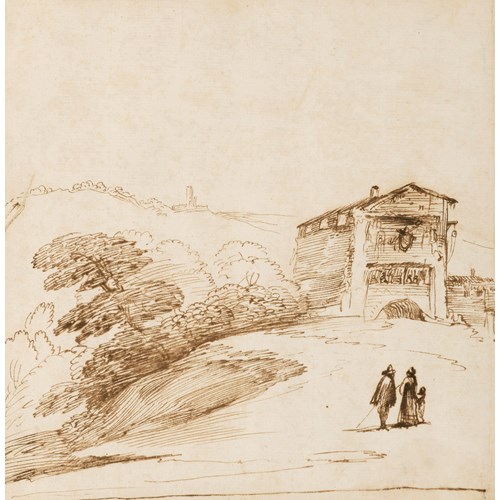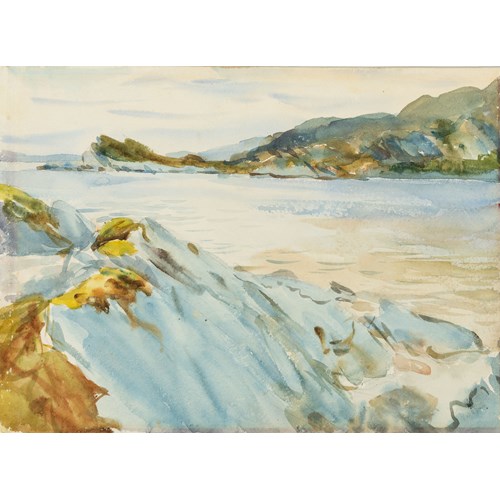Marketplace
A Horse-Drawn Carriage and its Team
Jacques-François-Joseph SWEBACH-DESFONTAINES
A Horse-Drawn Carriage and its Team
Period 1750-1850, 18th century, 19th century
Origin France
Medium Watercolour, Pen, Brown ink, Brown wash
Dimension 18.4 x 61.1 cm (7¹/₄ x 24 inches)
Watercolour, pen and brown ink and brown wash, with touches of white heightening and framing lines in brown ink.
Throughout his career, Swebach-Desfontaines was particularly admired for his paintings, drawings and engravings of equestrian subjects. This can be seen almost from the very start of his independent career, when, at the age of nineteen, he sent a group of drawings to the Exposition de la Jeunesse of 1788. As a reviewer of the exhibition, writing in the Mercure de France, noted, ‘A suite of drawings in wash and gouache attracted me and piqued my curiosity...They depict rest stops, encampments, marches. I found in them a spirit, a finesse, a lightness of touch and a very rare skill, to show the details without spoiling the main effect.’
His draughtsmanship continued to be admired throughout his career. As one modern scholar has noted of Swebach-Desfontaines, ‘The spectacular events of the period gave him the opportunity to indulge his brilliant draughtsmanship [and] his drawings were the source of many engravings and lithographs…The talent displayed by this contemporary of [Nicolas-Antoine] Taunay, [Jean-Louis] Demarne and Carle Vernet is that of an observer: the ability to group a great many persons on a single surface, the variety and vivacity of the figures, the extraordinary art of subordinating details to the general effect. This is all rendered by precise drawing, a fine touch, and a vivid coloring indicative of quick vision and able, rapid execution.’
The present sheet was once in the collection of the French scholar and expert Gaston Delestre (1913-1969), who published studies of the work of Baron Antoine-Jean Gros and Gustave Courbet, and owned drawings by both artists and many others, as well as prints.
Throughout his career, Swebach-Desfontaines was particularly admired for his paintings, drawings and engravings of equestrian subjects. This can be seen almost from the very start of his independent career, when, at the age of nineteen, he sent a group of drawings to the Exposition de la Jeunesse of 1788. As a reviewer of the exhibition, writing in the Mercure de France, noted, ‘A suite of drawings in wash and gouache attracted me and piqued my curiosity...They depict rest stops, encampments, marches. I found in them a spirit, a finesse, a lightness of touch and a very rare skill, to show the details without spoiling the main effect.’
His draughtsmanship continued to be admired throughout his career. As one modern scholar has noted of Swebach-Desfontaines, ‘The spectacular events of the period gave him the opportunity to indulge his brilliant draughtsmanship [and] his drawings were the source of many engravings and lithographs…The talent displayed by this contemporary of [Nicolas-Antoine] Taunay, [Jean-Louis] Demarne and Carle Vernet is that of an observer: the ability to group a great many persons on a single surface, the variety and vivacity of the figures, the extraordinary art of subordinating details to the general effect. This is all rendered by precise drawing, a fine touch, and a vivid coloring indicative of quick vision and able, rapid execution.’
The present sheet was once in the collection of the French scholar and expert Gaston Delestre (1913-1969), who published studies of the work of Baron Antoine-Jean Gros and Gustave Courbet, and owned drawings by both artists and many others, as well as prints.
Period: 1750-1850, 18th century, 19th century
Origin: France
Medium: Watercolour, Pen, Brown ink, Brown wash
Signature: Signed Swebach near the lower left.
Dimension: 18.4 x 61.1 cm (7¹/₄ x 24 inches)
Provenance: Gaston Delestre, Paris
Thence by descent.
Exhibition: Paris, Galerie Dina Vierny, Cent aquarelles du XIXe siècle, 1947, no.100.
More artworks from the Gallery








_T638278098131351502.jpg?width=500&height=500&mode=pad&scale=both&qlt=90&format=jpg)
